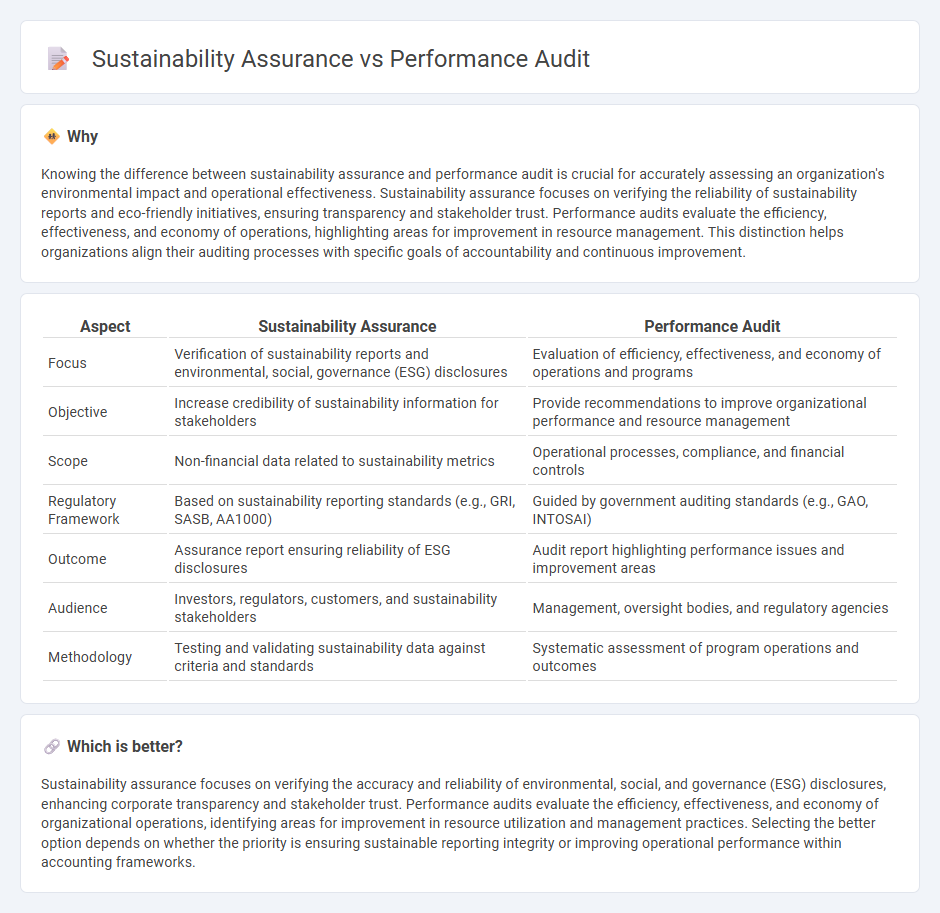
Sustainability assurance focuses on verifying the accuracy and reliability of a company's environmental, social, and governance (ESG) disclosures, ensuring stakeholders receive trustworthy information about corporate sustainability efforts. Performance audit evaluates the efficiency, effectiveness, and economy of organizational operations, assessing whether resources are used optimally to achieve intended objectives. Explore more about how these distinct audit approaches impact corporate transparency and accountability.
Why it is important
Knowing the difference between sustainability assurance and performance audit is crucial for accurately assessing an organization's environmental impact and operational effectiveness. Sustainability assurance focuses on verifying the reliability of sustainability reports and eco-friendly initiatives, ensuring transparency and stakeholder trust. Performance audits evaluate the efficiency, effectiveness, and economy of operations, highlighting areas for improvement in resource management. This distinction helps organizations align their auditing processes with specific goals of accountability and continuous improvement.
Comparison Table
| Aspect | Sustainability Assurance | Performance Audit |
|---|---|---|
| Focus | Verification of sustainability reports and environmental, social, governance (ESG) disclosures | Evaluation of efficiency, effectiveness, and economy of operations and programs |
| Objective | Increase credibility of sustainability information for stakeholders | Provide recommendations to improve organizational performance and resource management |
| Scope | Non-financial data related to sustainability metrics | Operational processes, compliance, and financial controls |
| Regulatory Framework | Based on sustainability reporting standards (e.g., GRI, SASB, AA1000) | Guided by government auditing standards (e.g., GAO, INTOSAI) |
| Outcome | Assurance report ensuring reliability of ESG disclosures | Audit report highlighting performance issues and improvement areas |
| Audience | Investors, regulators, customers, and sustainability stakeholders | Management, oversight bodies, and regulatory agencies |
| Methodology | Testing and validating sustainability data against criteria and standards | Systematic assessment of program operations and outcomes |
Which is better?
Sustainability assurance focuses on verifying the accuracy and reliability of environmental, social, and governance (ESG) disclosures, enhancing corporate transparency and stakeholder trust. Performance audits evaluate the efficiency, effectiveness, and economy of organizational operations, identifying areas for improvement in resource utilization and management practices. Selecting the better option depends on whether the priority is ensuring sustainable reporting integrity or improving operational performance within accounting frameworks.
Connection
Sustainability assurance and performance audit intersect by evaluating the accuracy and effectiveness of an organization's sustainability initiatives and operational outcomes. Sustainability assurance verifies the reliability of environmental, social, and governance (ESG) disclosures, while performance audits assess the efficiency and compliance of related processes. Both practices enhance transparency and accountability, supporting informed decision-making and stakeholder confidence in sustainable business practices.
Key Terms
**Performance Audit:**
Performance audit evaluates the efficiency, effectiveness, and economy of an organization's operations, ensuring public resources are managed responsibly. It provides objective analysis of financial management, compliance with policies, and achievement of intended outcomes, often used by government agencies and public-sector organizations. Explore how performance audit drives transparency and accountability in resource utilization.
Efficiency
Performance audit evaluates organizational efficiency by examining resource utilization, process effectiveness, and cost control to ensure optimal operations and value for money. Sustainability assurance assesses efficiency related to environmental and social impacts, verifying data accuracy on resource consumption and the effectiveness of sustainable practices. Explore more to understand how these evaluations enhance operational and sustainability performance.
Effectiveness
Performance audits assess the effectiveness of processes and controls in achieving organizational objectives, focusing on compliance, economy, and efficiency. Sustainability assurance evaluates the accuracy and reliability of environmental, social, and governance (ESG) disclosures, emphasizing the effectiveness of sustainability initiatives in meeting stakeholder expectations. Explore the distinct methodologies and outcomes of performance audits and sustainability assurance to understand their impact on organizational effectiveness.
Source and External Links
Performance Audit - Meaning, Example, Objective - WallStreetMojo - A performance audit assesses operations, efficiency, effectiveness, and legal compliance of an entity to determine if functions work as intended and to implement improvements, mostly in governmental and nonprofit organizations.
What is a Performance Audit? - CityAuditor - Seattle.gov - Performance audits evaluate government program efficiency and effectiveness against laws and best practices to identify opportunities for improvement and ensure objectives are met.
Performance/Operational Audits - Air Force Audit Agency - These audits provide assurance by evaluating evidence against set criteria, helping management improve program performance, reduce costs, and enhance accountability.
 dowidth.com
dowidth.com